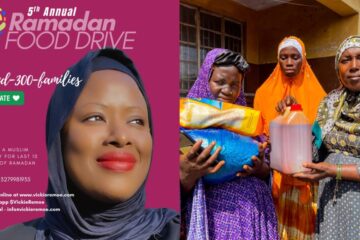Kente Is Officially Ghanaian – Ghana’s First Geographical Indication
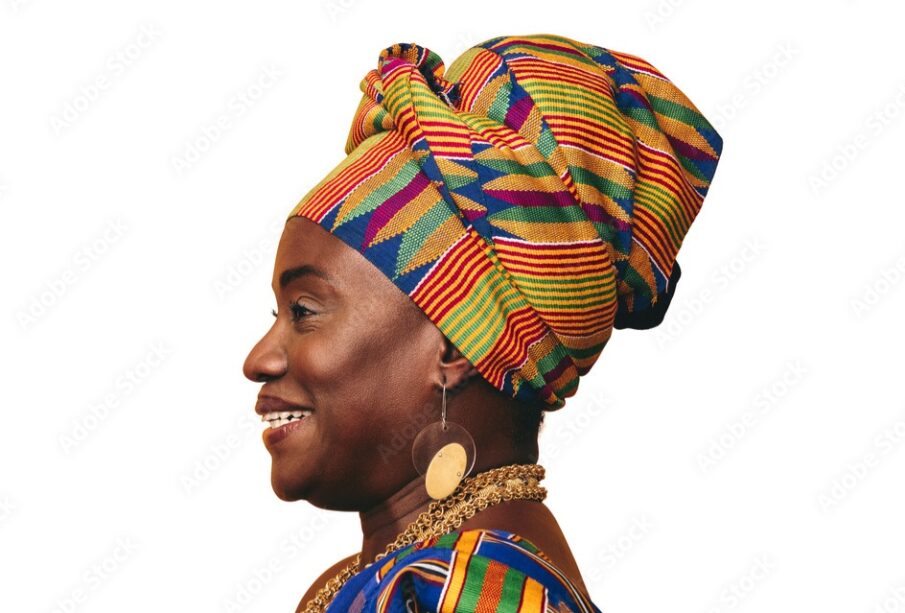
Ghana’s beloved cultural treasure, Kente, has officially joined the ranks of the world’s most protected and celebrated heritage products. The vibrant handwoven cloth has now been recognised as Ghana’s first-ever Geographical Indication (GI), a global certification that ties a product’s reputation and quality to its place of origin.
The Kente’s new GI status underscores the economic potential of African creativity. It will open doors for increased exports, job creation, and sustainable income for kente weavers and artisans across Ghana and the continent.
This monumental achievement puts kente alongside global treasures like Champagne from France, Tequila from Mexico, and Darjeeling Tea from India, all products whose identity and value are inseparable from the lands and traditions that created them.
A G.I is seen as a seal of authenticity. It ensures that only Kente woven in the designated Ghanaian communities, using traditional methods passed down through generations, can rightfully bear the name Kente.
The historic announcement was made on September 30th, 2025, at the La-Palm Royal Beach Hotel in Accra, marking a major milestone for Ghana’s creative and cultural industries. The event was organised by the Registrar-General’s Department in collaboration with the World Intellectual Property Organization (WIPO) and brought together key stakeholders from across the creative sector.
Reflecting on the achievement, Richardson Commeyfio, Special Assistant to the Minister of Tourism, Culture, and Creative Arts, expressed deep pride.
“It was refreshing and nostalgic for me to be a part of this all-important event to witness the end product of what we have supported with our expertise for the past seven years,” he said.
How Did the Kente Obtain its GI Status?
The acquisition of the Kente’s new status was led by the Government of Ghana who initiated and completed the G.I application process.
This initiative, which was ongoing since 2018, was primarily driven by the Government, with the Ministry of Tourism, Culture, and Creative Arts providing crucial support and expertise. Additional backing came from the Registrar General’s Department and the World Intellectual Property Organization (WIPO).
This recognition further complements the earlier listing of Kente on the UNESCO Representative List of Intangible Cultural Heritage in December 2024, a result of collaborative efforts by the same entities.
Reactions from the Ghanaian Community
Across Ghana, the announcement sparked celebration and emotion. Ghana’s Kente ambassador, Amma Prempeh, in an interview with GhanaWeb described it as a victory.
For Prempeh, recognising kente as a GI is a powerful declaration to the world that kente is not just a fabric, but a living heritage woven with the identity, stories, and spirit of the Ghanaian people.
“Kente is the soul of our tradition, a symbol of prestige, wisdom, and unity. For centuries, its patterns and colours have spoken volumes. Now, with its GI status, it gains international legal protection and recognition, ensuring that the legacy of authentic Ghanaian Kente remains in the hands of those who have nurtured it for generations,” Prempeh said.
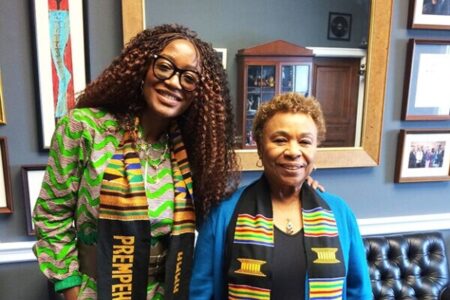
Amma Prempeh (left) with U.S. Congresswoman, Barbara Lee (right)
Ghanaians have also taken to social media to share their joy.
X (formerly Twitter) user Prime Osagyefo shared, “The great Ghanaian cultural heritage. The beautiful Ghanaian culture.”
X User, Mercy C. Adjabeng, shared a round of applause for the achievement.
Bigjay said, “This is good news but should have been done long ago!”
Mohamed Kofi Kamara also shared with excitement, “It should be part of UNESCO world heritage!”
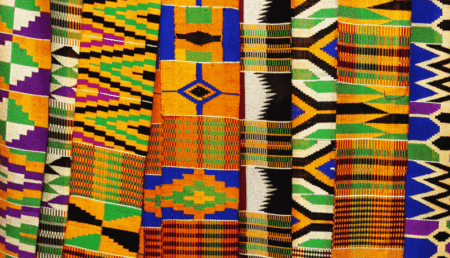
Ghanaian Kente Cloth/ Image by RGD
What This Means for Ghana and Africa as a Whole
For Ghanaian weavers and artisans, the G.I status gives way to economic empowerment. The recognition strengthens Kente’s brand value globally, offering new opportunities for exports, tourism, and fair trade.
It also provides legal backing against imitation, ensuring that only authentic Ghanaian Kente enjoys the global spotlight.
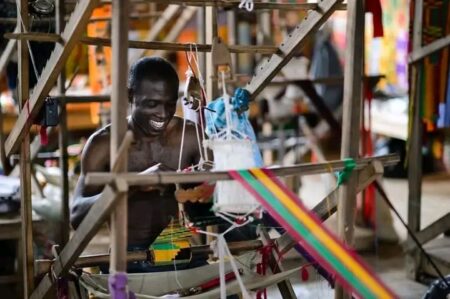
Ghanaian Kente weaver/ Image from Ghana Black Star of Africa Facebook
As Prempeh summed it up, “The GI status is a victory for our weavers, our cultural custodians, and every Ghanaian who wears Kente with pride. It opens doors for economic growth, tourism, intellectual property protection, and global branding, while safeguarding the artistry and integrity of indigenous craftsmanship.”
With this recognition, Ghana doesn’t just protect a fabric, it preserves a living heritage woven from pride, identity, and centuries of tradition.
The recognition of Kente as a GI product also marks a proud moment for the African continent. Across Africa, countries like South Africa with its Rooibos tea and Karoo lamb, and Cameroon with its Penja Pepper, have used G.I status to protect their unique products and boost their local economies.
In South Africa, the GI protection of the Rooibos tea which was attained in 2013, has led to a landmark benefit-sharing agreement, channeling about 1.5% of the farm-gate price which is roughly R12 million annually to the indigenous Khoi and San communities who first cultivated and used the plant. The arrangement has created jobs and funded local development projects across the Cederberg region.
In Cameroon, the famed Penja pepper also received GI status in 2013. Since then, the price of the spice has gone up, the number of registered producers has grown more, and farmer’s incomes have increased substantially.
For Ghana, this new status positions Kente to achieve similar success. It means the fabric can command higher global prices, protect local weavers from mass-produced imitations, and open new avenues for tourism and export. All these translate into more sustainable jobs for thousands of Ghanaians, especially women and youth in weaving communities.
More broadly, Ghana’s move signals that cultural and creative goods, not just agricultural goods, can also earn this level of international protection. It sets a powerful precedent for other countries with iconic craft and heritage products like Nigeria’s traditional Aso Oke and Kenya’s handmade beadworks.
Together, these efforts could redefine Africa’s place in the global value chain, proving that heritage and craftsmanship are not just symbols of identity, but tools of growth and prosperity for many people.


